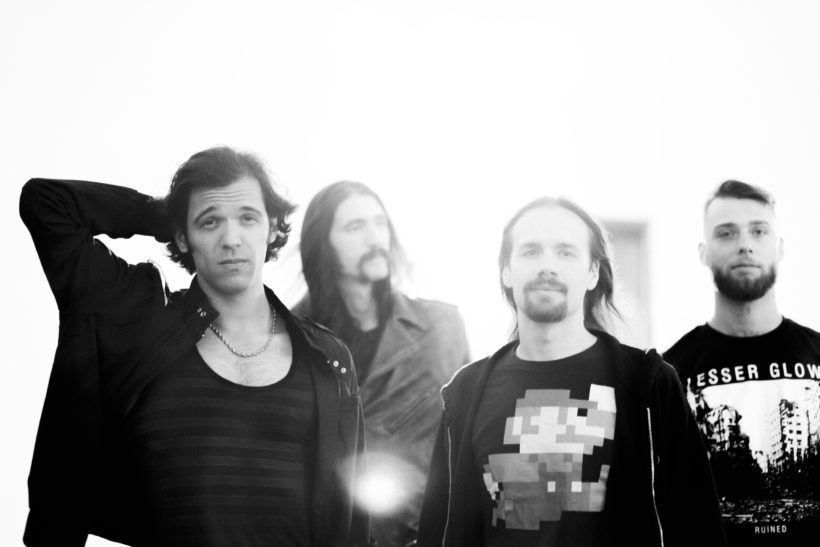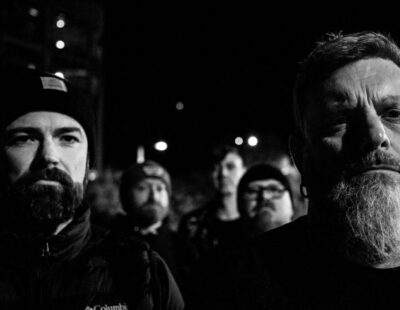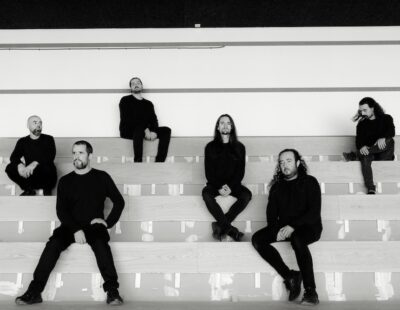
Boston’s Chuggernaut play a blend of subgenres—namely groove, thrash, doom and post-hardcore—which they refer to as “regressive metal” because of the specific instruments they use. As such, they combine a progressive, modern sound with those influences to create what’s heard on Kodiak, their sophomore EP. Decibel caught up with the band to talk about Kodiak, which you can stream below, plus cover songs and finding a new vocalist during the recording process.
You describe your sound as “regressive metal.” Can you explain what that means to you?
I (Dave Cohen) play a fanned-fret 8-string guitar, and Marv (David Marvouglio) uses a 5-string bass, just as a progressive metal band might. All four of us in Chuggernaut have vast musical backgrounds and training as well. But, instead of trying to push the musical envelope forward, we’re more interested in putting our own twist on the “throwback” heavy sounds of metal and rock that the four of us loved growing up, and using them in a modern context.
Genre labels are a tricky thing. You want people that haven’t heard you to find your music and be able to imagine what you sound like and get excited about it. On the other hand, you want the listener to appreciate your music for what it is, rather than solely comparing it to the stereotypes of the genre that you described. ‘Regressive Metal’ plays on the idea of a progressive metal band; complete with 7 or 8-string guitars and a complex, techy sound, but at the same time makes you wonder what the exact opposite of that would be. It sparks some curiosity.
Vocalist David Benites joined in the middle of the recording process for Kodiak. How did you find him?
I actually booked one of our first shows with David Benites’s old deathcore band Buried Electric, where he was vocalist for 8 years. When we parted ways with our previous singer, Jeff, and started holding auditions, I remembered being impressed with David’s vocals and showmanship, but wasn’t sure if he was the right fit. We were looking for a rock vocalist, and I had only heard him showcase his metal screaming ability. However, many professional vocalists from different areas of rock and metal in our network kept recommending him, so I shot him a message.
David’s audition was phenomenal. He absolutely crushed on our older songs. Instead of just showing he had them memorized, he was adding to the parts and actually performing the tracks with us; rocking out, leg up on the kick drum and belting in Blaize’s face. He fit right in. We also had vocalists write lyrics to one of our new songs on ‘Kodiak’ for the audition. David not only showed up with main vocal parts written, but had a recording all demoed out, with layers of harmonies and background vocals as well. Come to think of it, the majority of what he wrote became the final version of ‘Aftermath’.
What was the writing process like for Kodiak? How long have you been working on these songs?
Kodiak had been an ongoing project for awhile before we finally got into the studio. Actually, the opening heavy riff to ‘Disposable Monuments’ dates back to before we even recorded our first EP. I called it the “seed riff,” because all of my attempts to finish that tune spun off into their own songs. What became ‘Disposable Monuments’ didn’t really get finished until the weekend before we drove down to Eyeland Studios.
We’re very democratic in our writing and certainly were for Kodiak, with parts and transitions getting reworked and decided on as a group; fortunately we usually agree on when a song feels complete. I think that’s part of why it’s so refreshing having David in the band. Chuggernaut is a vocal-driven band. How the vocals play with everything else is hugely important, and David is right there in the trenches with us, spit-balling melodic and lyrical ideas, even recording vocal demos while the song is still “baking.”
Blaize, Marv and I wanted to fully showcase our new singer’s ability, so we wrote all new vocals with him for ‘Kodiak’. David and I would meet up often for vocal writing sessions, sometimes working for 8 hours straight. During those long days, it became clear we were both going through several heavy transitions in our respective lives. Even at that early point we knew the subject matter of the record would revolve around those transitions,and drive into rebuilding ourselves.
Prior to this EP, you covered Led Zeppelin’s “Kashmir.” What are some other songs you’d like to cover at some point?
Oh man. We’ve had ideas from Covering Kansas’s “Carry on Wayward Son” with breakdowns, to “Judith” by A Perfect Circle, but at 150x the speed. We definitely have a few tricks up our sleeve, so you can always expect the unexpected from us.







